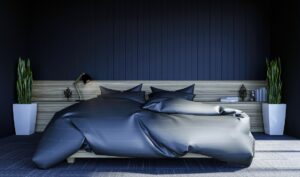
According to a recent study, even the slightest bit of light exposure can disrupt our natural sleep patterns and increase our risk for these health issues. So, if you’re looking to get better sleep and improve your health, make sure to avoid all forms of light exposure during bedtime.
Can’t stand sleeping in the dark? Try using a sleeping mask or blackout curtains to create an environment that is conducive to better sleep.
For the study published in the journal, Sleep, researchers analyzed 552 study participants and found that less than half consistently had five hours of complete darkness per day. The other participants were exposed to some light even during the darkest hours of the evening while asleep. Light exposure was measured over seven days with a wrist-worn device.
Researchers were able to determine through a small sample of the participants that those who were exposed to any amount of light while sleeping at night were significantly more likely to be obese and have diabetes and high blood pressure than those who had no light exposure during the night.
“Whether it be from one’s smartphone, leaving a TV on overnight, or light pollution in a big city, we live among an abundant number of artificial sources of light that are available 24 hours a day,” said study corresponding author Dr. Minjee Kim. “Older adults already are at higher risk for diabetes and cardiovascular disease, so we wanted to see if there was a difference in frequencies of these diseases related to light exposure at night.”
Since this was a cross-sectional study, investigators could not determine if obesity, diabetes, or hypertension caused people to sleep with a light on or if the light contributed to the progression of the conditions. Some conditions, such as diabetes, may cause people to use the bathroom more in the middle of the night, or they may need to leave a light on to reduce the risk of falls if they experience numbness in their limbs.
This study helps to outline the importance of sleeping in the dark. To help keep the light low, a few steps can be taken. Change light switches to dimmer switches that can be used if needed during the night. Change lightbulbs in bedrooms to red or amber light instead of blue or white light, and use blackout shades or eye masks to keep out light from the outside.
Optimal Sleep
Sleep Sure Plus is designed to help promote optimal sleep and restfulness through various ingredients. One of the most important ingredients included in this unique formula is melatonin. Melatonin is a hormone essential for regulating the circadian rhythm (the body’s internal clock). Sleep Sure Plus also contains valerian, one of the best natural ingredients for promoting rest and relaxation. These two essential ingredients are joined by another 6, which all work together to provide a better quality of sleep.